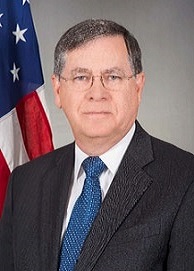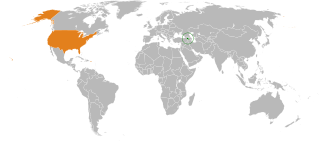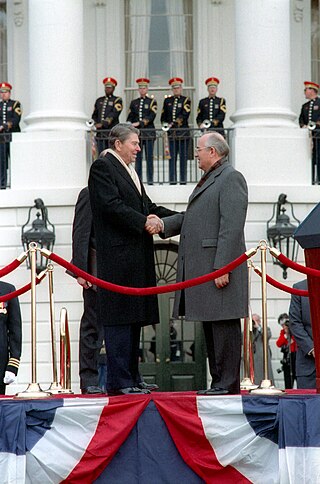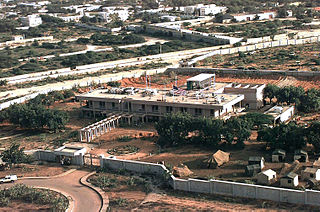
The United States Department of State (DOS), or simply the State Department, is an executive department of the U.S. federal government responsible for the country's foreign policy and relations. Equivalent to the ministry of foreign affairs of other nations, its primary duties are advising the U.S. president on international relations, administering diplomatic missions, negotiating international treaties and agreements, and representing the U.S. at the United Nations. The department is headquartered in the Harry S Truman Building, a few blocks from the White House, in the Foggy Bottom neighborhood of Washington, D.C.; "Foggy Bottom" is thus sometimes used as a metonym.

Ambassadors of the United States are persons nominated by the president to serve as the country's diplomatic representatives to foreign nations, international organizations, and as ambassadors-at-large. Under Article II, Section 2 of the U.S. Constitution, their appointment must be confirmed by the United States Senate; while an ambassador may be appointed during a recess, they can serve only until the end of the next session of Congress, unless subsequently confirmed.

The United States Foreign Service is the primary personnel system used by the diplomatic service of the United States federal government, under the aegis of the United States Department of State. It consists of over 13,000 professionals carrying out the foreign policy of the United States and aiding U.S. citizens abroad. The current director general is Marcia Bernicat.

The Bureau of International Organization Affairs (IO) is a bureau in the United States Department of State that creates and executes U.S. policy in the United Nations and other international organizations. It is headed by the Assistant Secretary of State for International Organization Affairs. The IO is charged with developing and implementing the policies of the U.S. government with respect to the United Nations and its affiliated agencies, as well as within certain other international organizations. The Bureau of International Organization Affairs was created in order to strengthen the United States involvement in important international relations.

David Michael Satterfield is an American diplomat and ambassador, who has served extensively in the Middle East, including the Persian Gulf area, Lebanon, and Iraq. He later served as a senior advisor on Iraq for Secretary of State Condoleezza Rice and was director general of the Multinational Force and Observers, the peacekeeping force for the Sinai Peninsula from June 2009 until August 2017. He was chargé d'affaires to Egypt from August 2013 to January 2014 and was subsequently Special Advisor to the Secretary of State for Libya. From September 2017 to June 2019 he served as the acting assistant secretary of state for Near Eastern affairs, and was confirmed as U.S. ambassador to Turkey on June 27, 2019.
The Office of eDiplomacy is an applied technology think tank for the United States Department of State. The Office of eDiplomacy is staffed by Foreign and Civil Service Officers, as well as contract professionals. There are four branches: the Diplomatic Innovation Division (DID), the Knowledge Leadership Division (KLD), the Customer Liaison Division (CLD), and the Business Requirements Unit (BRU).

Kristie Anne Kenney is a former senior U.S. diplomat who served as the 32nd Counselor of the United States Department of State from 2016 to 2017. She is a recipient of the Secretary of State's Distinguished Service Award and held the nation's highest diplomatic rank of Career Ambassador in the United States Foreign Service. She served as the Department of State Transition Coordinator for the 2016–17 transition.

The Distinguished Honor Award is an award of the United States Department of State. Similar versions of the same award exist for the former U.S. Information Agency, Arms Control and Disarmament Agency, and USAID. It is presented to groups or individuals in recognition of exceptionally outstanding service or achievements of marked national or international significance.

The dissolution of the Soviet Union in December 1991 brought an end to the Cold War and created an opportunity for establishing bilateral relations between the United States with Armenia and other post-Soviet states as they began a political and economic transformation. The United States recognized the independence of Armenia on 25 December 1991, and opened an embassy in Armenia's capital Yerevan in February 1992.

In the years after the September 11, 2001 attack on the World Trade Center in New York City, Yemen became a key site for U.S. intelligence gathering and drone attacks on Al-Qaeda. According to the 2012 U.S. Global Leadership Report, 18% of Yemenis approved of U.S. leadership, with 59% disapproving and 23% uncertain. According to a February 2015 report from the Congressional Research Service, U.S. officials considered Al-Qaeda in the Arab Peninsula the Al-Qaeda affiliate "most likely to attempt transnational attacks against the United States."

Condoleezza Rice served 2005–2009 as United States Secretary of State under George W. Bush. She was preceded by Colin Powell and followed by Hillary Clinton. As secretary of state she traveled widely and initiated many diplomatic efforts on behalf of the Bush administration.

The Quadrennial Diplomacy and Development Review (QDDR) is a study by the United States Department of State, conducted beginning in 2009 and intended to be done every four years, that analyzes the short-, medium-, and long-term blueprint for the United States' diplomatic and development efforts abroad. It seeks to plan on a longer-term basis than the usual year-to-year, appropriations-based practice, and to integrate diplomacy and development missions. It similarly seeks to correlate the department’s missions with its capacities and identify shortfalls in resourcing. Finally, it is a precursor to core institutional reforms and corrective changes. The first review was completed by the end of 2010. A second review began during 2014 and was released in April 2015. No further reviews have taken place.

The U.S. Global Leadership Coalition (USGLC) is a nonprofit organization formed by a coalition of American businesses and NGOs, senior national security and foreign policy experts, faith-based and community leaders from across the United States who promote increased support for the United States’ diplomatic and development efforts among both politicians and the public.

Full spectrum diplomacy is a combination of traditional, government-to-government diplomacy with the many components of public diplomacy as well as the integration of these two functions with other instruments of statecraft. The term was coined by John Lenczowski, founder and president of The Institute of World Politics in Washington, D.C. in his book Full Spectrum Diplomacy and Grand Strategy: Reforming the Structure and Culture of U.S. Foreign Policy which was released in May, 2011.

The Thomas Jefferson Star for Foreign Service is an award of the United States Department of State. It is presented to employees of State, USAID, and civilian contractors assigned to diplomatic and consular facilities for events that lead to death or serious illness or injury. It is roughly comparable to the U.S. military's Purple Heart, but since the criteria for the award is so strict, nearly all of them are awarded posthumously.
African-Americans in foreign policy in the United States catalogs distinguished African Americans who have and continue to contribute to international development, diplomacy, and defense through their work with the U.S. Department of State, the U.S. Agency for International Development, the U.S. Information Agency, and the U.S. Congress, and other notable agencies and non-governmental organizations. The creators acknowledge the presence of the interagency contributions to the foreign affairs realm, and welcome additional content to showcase the achievements of African-Americans in other relevant USG agencies.

Cyber-diplomacy is the evolution of public diplomacy to include and use the new platforms of communication in the 21st century. As explained by Jan Melissen in The New Public Diplomacy: Soft Power in International Relations, cyber-diplomacy “links the impact of innovations in communication and information technology to diplomacy.” Cyber-diplomacy is also known as or is part of public diplomacy 2.0, EDiplomacy, and virtual diplomacy. Cyber-diplomacy has as its underpinnings that, “it recognizes that new communication technologies offer new opportunities to interact with a wider public by adopting a network approach and making the most of an increasingly multicentric global, interdependent system.”

The Embassy of the United States of America to Somalia is a diplomatic mission of the United States in Mogadishu, Somalia from 1960 to 1991. In 1957, the US opened a consulate-general in Mogadishu—the capital of the Trust Territory of Somalia, a UN trusteeship under Italian administration. The consulate was upgraded to embassy status in July 1960, when the US recognized Somalia's independence and appointed an ambassador. The embassy served to counter Soviet influence during the Cold War and also served as a base for the United States Agency for International Development, which had a large presence in the country. In 1989, the embassy moved from a dilapidated building in central Mogadishu to a new compound on the outskirts of the city.

The Office of Fine Arts (M/FA) is a division of the U.S. Department of State reporting to the Under Secretary of State for Management. The mission of the office is to administer appropriate settings for dialogue between U.S. officials and their international guests, to illustrate the continuity of American diplomacy through relevant objects, and to celebrate American cultural heritage through the acquisition, preservation and display of works of art with people around the world.

Somaliland and the United States do not have official diplomatic relations. While Somaliland operates a representative liaison office in Washington, D.C., it does not have formal diplomatic status under the provisions of the Vienna Convention on Diplomatic Relations. Both countries do maintain contact as delegations from both sides have met in the past.

















